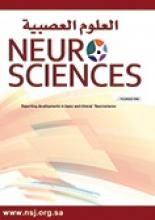Abstract
Neurosciences continues to be the leading journal for Neurosciences in Saudi Arabia and the Middle East. In January 2007, Neurosciences was indexed by Thomson ISI in Science Citation Index Expanded online at ISI Web of KnowledgeSM and Neurosciences Citation Index. Since then a significantly increased volume of scientific articles continues to be submitted to the journal by enthusiastic authors, a fact that enriches the scientific contents of the journal. In 2008, we had a total number of website hits of 495,625 with a monthly average of 41,000. We received a total of 155 manuscripts, with a monthly average of 13 and an average rejection rate of 29%. From these, we published a total of 100 articles, totaling 523 pages for the entire volume. Forty-nine percent of these were original articles. Fifty-eight percent of published articles were from the Eastern Mediterranean Region (EMR), with 30% from KSA, 5% from the Gulf, and 23% from other Arab and EMR countries. The remaining 42% of published articles we received from Canada, India, Japan, Malaysia, and Turkey. The average time from received to acceptance of original articles was 4 months and4.9 months for acceptance to publication. Reasons for rejection included unrelated topics, poor contents, or duplicate publication. In addition to our 4 regular issues in 2008, we published a supplement of abstracts presented at the 16th Saudi Neuroscience Symposium. We would like to thank the Editorial and Advisory Board Members for their significant contribution to maintain the standards of Neuroscience and looking forward to their important continued role in achieving our goals for 2009. In 2009, we aim to increase the number of issues to meet the increased load of manuscripts. Our objective is to enrich the scientific Neuroscience material presented by the journal with important topic reviews and regular neuroscience quizzes to achieve PubMed indexing. We will continue to promote our new web-based manuscript submission interface; strive to reduce the time from received to acceptance and acceptance to publication to no more than 3 to 4 months each; attend regional conferences, and participate in academic activities to encourage submission of high quality articles; encourage editorial board members to solicit potential authors from conferences; and commission our best reviewers to write good articles and encourage editorial board members to contribute material for a regular editorial feature on topical issues. We would also like to introduce a number of new features, such as highlights from international neuroscience meetings, regular basic neuroscience review articles, and 5 MCQs on basic/clinical neuroscience in each issue. These features will greatly enhance the journal and make it more attractive to trainees and board residents. However, their success will rely heavily on the contributions that we receive. The strict check for duplicate publication and plagiarism will continue, and if detected appropriate action will be taken in accordance with international guidelines. A small number of articles were rejected last year due to extensive plagiarism and duplicate publication. We hope all our readers benefitted from the introduction of the Arabic abstracts, and enjoyed the new look and the feel of the journal. We extend our sincerest thanks to our authors, readers, reviewers, and board members, and wish all a successful year.
- Copyright: © Neurosciences
Neurosciences is an Open Access journal and articles published are distributed under the terms of the Creative Commons Attribution-NonCommercial License (CC BY-NC). Readers may copy, distribute, and display the work for non-commercial purposes with the proper citation of the original work.






